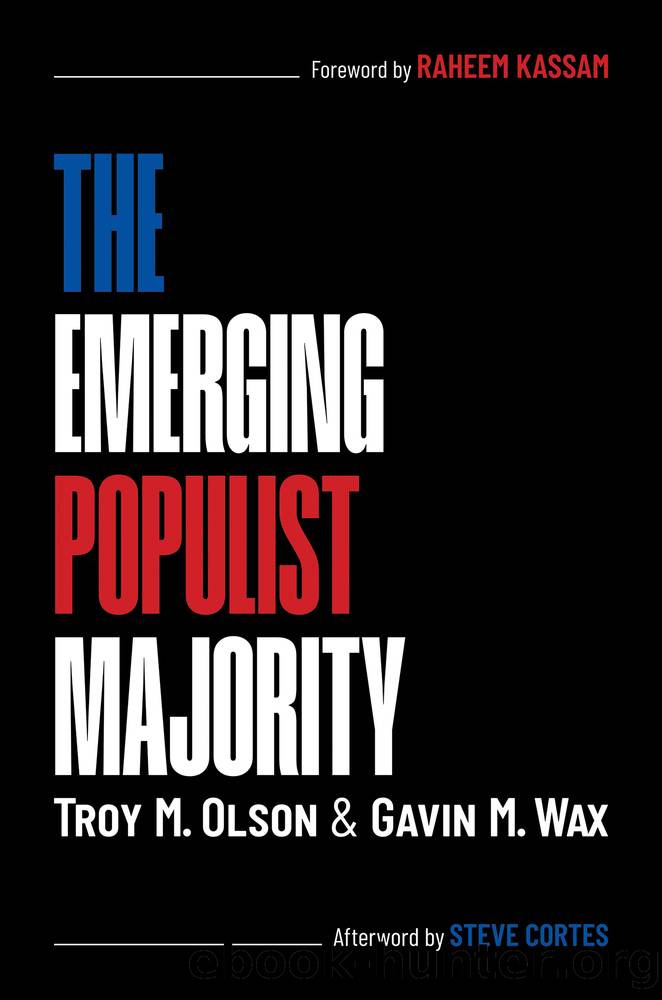The Emerging Populist Majority by Troy M. Olson

Author:Troy M. Olson
Language: eng
Format: epub
Publisher: Bombardier Books
Published: 2023-11-18T17:08:08+00:00
In so many ways, even in a loss, the 2020 demographic profile of the Trump-led Republican conservative and populist coalition was even more encouraging. As he outperformed his 2016 margins with black, Hispanic, and Asian voters, which subsequent 2021 elections and the 2022 midterms show were but a prologue to border working- and middle-class realignment of conservative Hispanics. Historically, since the 1960s, white Americans were polarized along ideological lines and that would motivate their voting pattern to a degree, but the same was not true for anyone else. However, conservative ideology holds relatively consistent across all racial demographics. Much of the 2020 growth in the Hispanic vote for Republicans was driven by this, and this realignment has a much higher chance of holding because it is held together by real issues and philosophy rather than the relatively small number of suburban and professional-class socially liberal, economically and fiscally conservative voters who are leaving the Republican Party for the Democratic Party or for the political wilderness.
More on the growing diversity and demography of this emerging coalition will be discussed in chapter 10, but the larger point is how much 2020âs vote gains by the Republicans undermine the Democratic âtheory of the caseâ of any emerging and longstanding advantage held. Only the deepest of partisans would still hold to this theory now, and if they do, they would do well to read this book, if only to gain additional context and reasons for their frustrations. Such a deep dive would be far healthier for the country rather than simply chalking up Republican gains to the simplistic analysis that is often given from a media that ought to be tuned out not just for divisiveness, but because it is increasingly hard to be accurate or hit the target if one does.
Another striking misunderstanding about the future of Americaâs politics and coalitions is the millennial conversation. While it is true this generation was the difference in electing Barack Obama not just in the primary over Hillary Clinton, and then providing key 66 percent to 32 percent margins over John McCain in 2008, itâs also a generation that is talked about as if itâs locked in to a straight-line analysis going forward. This is not surprising from a cultural place, as millennials are the children of baby boomers, another dominant generation whose early political experiences in American life and the promotion of early cohort liberal members to the corridors of political, media, and cultural power influenced greatly the inaccurate perceptions of a boomer generation that has since most often voted Republican. Another possible reflection of early voting patterns has been the pattern of generational development itself noted early on in Fourth Turning by Strauss and Howe, foremost observers of generational subcultures. âParents are slowing down the developmental clock, letting millennials linger longer in childhood, reversing what Richard Riley terms the âhurry-hustleâ of the Awakening.â76
Millennials, too, like their parents, will eventually vote Republican, just as every prior generation has at least once. But itâs most important to talk about the last decade of analysis.
Download
This site does not store any files on its server. We only index and link to content provided by other sites. Please contact the content providers to delete copyright contents if any and email us, we'll remove relevant links or contents immediately.
The Secret History by Donna Tartt(16658)
The Social Justice Warrior Handbook by Lisa De Pasquale(11493)
Thirteen Reasons Why by Jay Asher(7801)
This Is How You Lose Her by Junot Diaz(5798)
Weapons of Math Destruction by Cathy O'Neil(5046)
Zero to One by Peter Thiel(4834)
The Myth of the Strong Leader by Archie Brown(4795)
Promise Me, Dad by Joe Biden(4455)
Beartown by Fredrik Backman(4433)
Stone's Rules by Roger Stone(4422)
How Democracies Die by Steven Levitsky & Daniel Ziblatt(4413)
The Fire Next Time by James Baldwin(4350)
100 Deadly Skills by Clint Emerson(4085)
A Higher Loyalty: Truth, Lies, and Leadership by James Comey(4039)
Rise and Kill First by Ronen Bergman(4020)
The David Icke Guide to the Global Conspiracy (and how to end it) by David Icke(3891)
The Farm by Tom Rob Smith(3878)
Secrecy World by Jake Bernstein(3788)
The Doomsday Machine by Daniel Ellsberg(3737)
